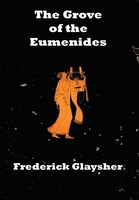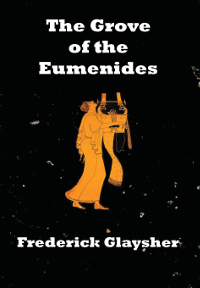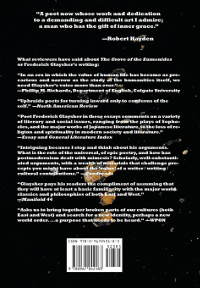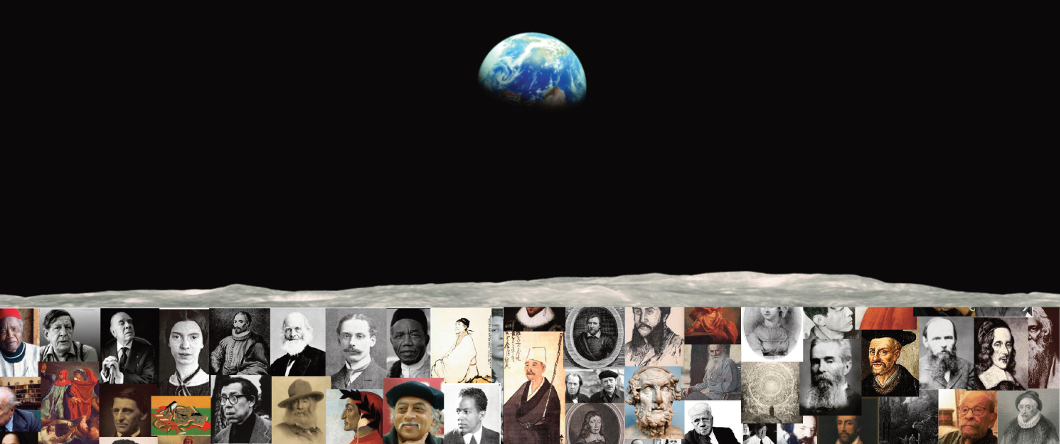The Grove of the Eumenides: Essays on Literature, Criticism, and Culture
By Frederick Glaysher. Hardcover. $38.00. Earthrise Press, 2007; 2024 Revised Edition. 340 pages. ISBN-13: 9780967042183. ISBN-10: 0967042186. Printed in the USA, UK, Australia, India.
BUY on Ingram Book Company's Shop Lightning Source
(I've removed my printed books from Amazon. Please don't buy the Kindle editions there either. They're outdate. Hackers and stalkers have deprived me of access to Amazon. Details on About)

Or USA: Bookshop.org - UK: UK.Bookshop.org, Kobo (ebooks), Order Books
 From New Preface (2024 Edition):
From New Preface (2024 Edition):
"All the essays in The Grove of the Eumenides were written after 1982 when I wrote my first draft of a plot outline for my epic poem The Parliament of Poets. These essays constitute and record my background study, as it were, over a period of more than twenty years..."

Frederick Glaysher evokes a global vision beyond the prevailing postmodern conceptions of life and literature that have become firmly entrenched in contemporary world culture.
East and West meet in a new synthesis of a global vision of humankind ranging over classic literature, ancient and modern, both Western and non-Western, from the dilemmas of modernity in Yeats, Eliot, Milosz, Bellow, Dostoevsky, to Lu Xun, Ryuichi Tamura, Kenzaburo Oe, Naguib Mahfouz, R. K. Narayan, many of the great epic poets, among others, from mimesis and deconstruction to the United Nations, with extensive essays on Chinese, Japanese, and South-Asian literature.
Clearly the work of a poet-critic attempting to embrace a larger portion of human experience than the personal postmodern self, The Grove of the Eumenides reaches toward an epic vision of the twenty-first century. All the muck and glory of American and international experience and history mix in the complex tension of a mind struggling with itself and its Age. Acutely perceptive of the spiritual and moral nuances of literature, criticism, and culture, Glaysher confronts the loss of religious faith in the modern world and breaks through to a vision of the unity of the human longing for transcendence.
Reviews
"Poet Frederick Glaysher in these essays comments on a variety of literary and social issues, ranging from the plays of Sophocles, and the major works of Japanese literature, to the loss of religion and spirituality in modern society and literature." —“New Titles Elected for Essay and General Literature Index,” September 2007, H. W. Wilson Co.
"Intriguing because I stop and think about his arguments. What is the role of the universal, of epic poetry, and how has postmodernism dealt with mimesis? Scholarly, well-substantiated arguments, with a wealth of materials that challenge precepts you might have about "value" of a writer/writing/cultural contributions." —Goodreads
What others have written about Glaysher's writing:
"Glaysher fits well within the literary tradition, as he shows with his allusions to or mentions of, among others, Augustine, Dante, Yeats, Dostoyevsky, and Hayden; however, his voice is distinct. Among contemporary poets, few have a vision as darkly haunting. Few also have the knowledge and the ability to handle contemporary issues with such presence of language." —Jack Magazine
"Upbraids poets for turning inward only to concerns of the self." —North American Review
"Glaysher takes us on a journey to that larger dimension of responsibility where thought meets action. Asks us to bring together broken parts of our cultures (both East and West) and search for a new identity, perhaps a new world order. " —WPON Interview
"Glaysher pays his readers the compliment of assuming that they will have at least a basic familiarity with the major world classics and philosophies of both East and West." —Manifold 44
Contents
Meditations in an Old Barn
The American Journey into the Land of Ulro
Postmodern American Poets: Debauchees of Dew
Mimesis
Poetry in the Nuclear Age
Yeats’s "Vision of Evil"
T. S. Eliot and "The Horror! The Horror!"
At the Dark Tower [Robert Browning]
Sophocles and the Plague of Modernity
Czeslaw Milosz’s Mythic Catholicism
Saul Bellow’s Soul
The Dialectic of Chinese Literature
Japan’s Floating Bridge of Dreams
India’s Kali Yuga
Robert Hayden in the Morning Time
Isaac and Peter: [Isaac Bashevis Singer and Walker Percy]
The Victory of World Governance
Epos

